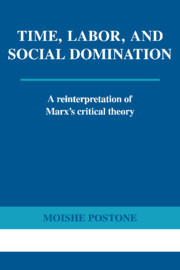Book contents
- Frontmatter
- Contents
- Acknowledgments
- Part I A critique of traditional Marxism
- Part II Toward a reconstruction of the Marxian critique: the commodity
- Chapter 4 Abstract labor
- Chapter 5 Abstract time
- Chapter 6 Habermas's critique of Marx
- Part III Toward a reconstruction of the Marxian critique: capital
- Selected bibliography
- Index
Chapter 6 - Habermas's critique of Marx
from Part II - Toward a reconstruction of the Marxian critique: the commodity
Published online by Cambridge University Press: 10 November 2009
- Frontmatter
- Contents
- Acknowledgments
- Part I A critique of traditional Marxism
- Part II Toward a reconstruction of the Marxian critique: the commodity
- Chapter 4 Abstract labor
- Chapter 5 Abstract time
- Chapter 6 Habermas's critique of Marx
- Part III Toward a reconstruction of the Marxian critique: capital
- Selected bibliography
- Index
Summary
On the basis of what I have developed thus far regarding Marx's analysis of labor in capitalist society, the difference between value and material wealth, and the sort of sociohistorical theory of consciousness and subjectivity implied by his categorial analysis, I shall now conclude my discussion of the trajectory of Critical Theory by considering some aspects of Jürgen Habermas's critique of Marx. This critique is integral to Habermas's effort to reconstruct a critical social theory adequate to the changed nature of postliberal capitalism that would also move beyond the pessimism of Critical Theory discussed in Chapter Three. As I have mentioned, though, Habermas's critique of Marx, which was closely tied in his earlier works to the distinction he had begun to develop between labor and interaction, is predicated upon some basic assumptions that informed the works of Pollock and Horkheimer. Habermas tries to surpass the limits of their work by calling into question the central constitutive role they, in traditional Marxist fashion, accorded “labor”; he does not, however, criticize the notion of “labor” itself. Although Habermas has modified his approach to social theory since his early critique of Marx, his traditional understanding of labor has continued to inform his work. This, I argue, has weakened his attempt to formulate a critical social theory adequate to modern society. What follows is not a full discussion of the development of Habermas's theory; rather, it is an attempt to extend my earlier argument regarding the limitations of any social critique that seeks to respond to the changed nature of contemporary capitalism while remaining tied to the traditional conception of “labor”—even if, like Habermas's, it successfully avoids the fundamental pessimism of Critical Theory.
- Type
- Chapter
- Information
- Time, Labor, and Social DominationA reinterpretation of marx's critical theory, pp. 226 - 260Publisher: Cambridge University PressPrint publication year: 1993



